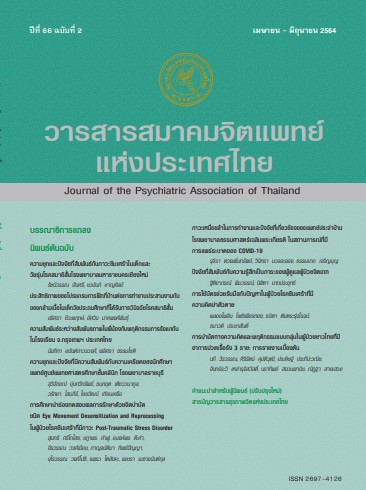Group Cognitive Behavioral Therapy for Thai Patients with Chronic Pain: A Case Series Report
Main Article Content
Abstract
Objective: This study aimed to perform a preliminary study of the treatment effects of a group-based CBT for the first time in Thailand for Thai patients with chronic pain.
Methods: Retrospective review and prospective study of three participants who attended an 8-sessions, twice-weekly, “CBT for Chronic Pain” program at the Faculty of Medicine Siriraj Hospital between July 6 and 31, 2018. The outcome measures were the pain severity, depression–anxiety–stress, utility, overall health, disability, and pain self-efficacy. These participants were assessed before and immediately after the program, and again at the 1-, and 6-month follow-ups.
Results: All three participants were married women with the mean age of 46.33 ± 8.62 (range, 37-54) years. They were all diagnosed with Major Depressive Disorder. Long-term positive trends were observed in every participant for depression–anxiety–stress, utility, and disability. Two-third of them had long-term improvements in pain severity, overall health, and pain self-efficacy.
Conclusion: Group-based CBT may have long-term benefits for Thai patients with chronic pain. It would be useful to further study with a large sample size and a control group.
Article Details
Articles submitted for consideration must not have been previously published or accepted for publication in any other journal, and must not be under review by any other journal.
References
2. Johannes CB, Le TK, Zhou X, Johnston JA, Dworkin RH. The prevalence of chronic pain in United States adults: results of an internet-based survey. J Pain 2010; 11: 1230-9.
3. Breivik H, Eisenberg E, O’Brien T; OPENMinds. The individual and societal burden of chronic pain in Europe: the case for strategic prioritization and action to improve knowledge and availability of appropriate care. BMC Public Health 2013; 13: 1229.
4. Dale R, Stacey B. Multimodal treatment of chronic pain. Med Clin North Am 2016; 100: 55-64.
5. Morley S, Eccleston C, Williams A. Systematic review and meta-analysis of randomized controlled trials of cognitive behavior therapy and behavior therapy for chronic pain in adults, excluding headache. Pain 1999; 80: 1-13.
6. Karlsson B, Burell G, Anderberg UM, Svardsudd K. Cognitive behavioral therapy in women with fibromyalgia: a randomized clinical trial. Scand J Pain 2015; 9: 11-21.
7. Lamb SE, Hansen Z, Lall R, Castelnuovo E, Withers EJ, Nichols V, et al. Group cognitive behavioral treatment for low-back pain in primary care: a randomized controlled trial and cost-effectiveness analysis. Lancet 2010; 375: 916-23.
8. Shpaner M, Kelly C, Lieberman G, Perelman H, Davis M, Keefe FJ. Unlearning chronic pain: a randomized controlled trial to investigate changes in intrinsic brain connectivity following cognitive behavioral therapy. Neuroimage Clin 2014; 5: 365-76.
9. Yang SY, McCracken LM, Morris RM. Psychological treatments for chronic pain in East and Southeast Asia: a systematic review. Int J Behav Med 2016; 23: 473-84.
10. Lubis DU, Jaya ES, Arjadi R, Hanum L, Astri K, Putri MD. Preliminary study on the effectiveness of short Group Cognitive Behavioral Therapy (GCBT) on Indonesian older adults. PLoS One. 2013 Feb 21; 8: e57198.doi: 10.1371/journal.pone.0057198. PubMed PMID: 23437339; PubMed Central PMCID: PMC3578808.
11. Lau OWY, Leung LNY, Wong LOL. Cognitive behavioural techniques for changing the coping skills of the patients with chronic pain. HKJOT 2002; 12: 13-20.
12. Cardosa M, Osman ZJ, Nicholas M, Tonkin L, Williams A, Aziz KA, et al. Self-management of chronic pain in Malaysian patients: effectiveness trial with 1-year follow-up. Transl Behav Med 2012; 2: 30-7.
13. Pragobsuk S. Tuicomepee A. Relationships among trait resilience, meaning in life, and psychological problems of study abroad scholarship students. J Public Health 2019; 49: 184-199.
14. Sonsa-ardjit N, Sakthong P. Reliability and validity of the Thai version of EQ-5D-5L questionnaire on patients with chronic disease. Chula Med J 2015; 59: 489-501.
15. Jirarattanaphochai K, Jung S, Sumananont C, Saengnipanthkul S. Reliability of the Roland–Morris Disability Questionnaire (Thai version) for the evaluation of low back pain patients. J Med Assoc Thai 2005; 88: 407-11.
16. Pensri P, Baxter GD, McDonough SM. Reliability and internal consistency of the Thai version of Roland-Morris Disability Questionnaire and Waddell Disability Index for back pain patients. Chula Med J 2005; 49: 333-49.
17. Khoo EL, Small R, Cheng W, Hatchard T, Glynn B, Rice DB, et al. Comparative evaluation of group-based mindfulness-based stress reduction and cognitive behavioural therapy for the treatment and management of chronic pain: a systematic review and network meta-analysis. Evid Based Mental Health 2019; 22: 26-35.
18. Cherkin DC, Sherman KJ, Balderson BH, Cook AJ. Effects of mindfulness-based stress reduction vs cognitive behavioral therapy and usual care on back pain and functional limitations in adults with chronic low back pain: a randomized clinical trial. JAMA 2016; 315: 1240-9.
19. Tan EPG, Tan ESL, Ng BY. Efficacy of cognitive behavioural therapy for patients with chronic pain in Singapore. Ann Acad Med Singapore 2009; 38: 952-9.
20. Castro MMC, Daltro1 C, Kraychete1 DC, Lopes J. The cognitive behavioral therapy causes an improvement in quality of life in patients with chronic musculoskeletal pain. Arq Neuropsiquiatr 2012; 70: 864-8.


